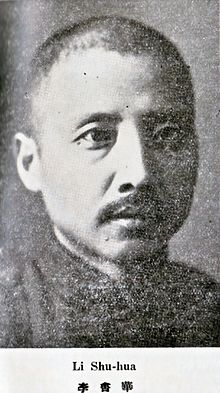Li Shu-hua | |
|---|---|
 Li in Who's Who in China 4th ed., published in 1931 | |
| Born | 23 September 1890 |
| Died | July 5, 1979 (aged 88) |
| Nationality | Republic of China |
| Alma mater | Universite de Paris University of Toulouse |
| Scientific career | |
| Fields | Biophysics |
| Institutions | Beijing University Academia Sinica Universite de Paris University of Hamburg |
Li Shu-hua (simplified Chinese: 李书华; traditional Chinese: 李書華; pinyin: Lǐ Shūhuá, courtesy name: Runzhang 潤章, 23 September 1890 – 5 July 1979) was a Chinese biophysicist and politician. He was an educator, and administrator at Beijing University and a Chinese diplomat. He was the brother of Li Shu-tien.
He went to France where he earned a doctorate in physics. In 1922 he returned to China where he worked at the Ministry of Education of the Republic of China and at the Academia Sinica.
From 1935 to 1949 he was chairman of the Chinese delegation of the Commission Mixte des Oeuvres Franco-Chinoises.[1] In 1945 he was elected a member of the Central Executive Committee of the Kuomintang and participated in the conference for the founding of the United Nations Educational, Scientific, and Cultural Organization (UNESCO). In 1946, 1947, and 1949 he attended the general conferences of the UNESCO as a Chinese delegate; in 1952 he served as chairman of the Chinese delegation to the Seventh General Conference of UNESCO.[2]
In 1949 he returned to France where he did research work at the Universite de Paris. In the academic year of 1951–52 he taught Chinese language and culture at the University of Hamburg in Germany.
He relocated to New York City in 1953 and died of a heart attack there in 1979.
- ^ C. Martin Wilbur|Preface to The Reminiscences of Li Shu-Hua as told to Minta Chou Wang, 1960-61, as part of Columbia University's Chinese Oral History Project
- ^ ibid